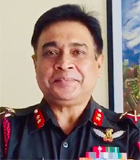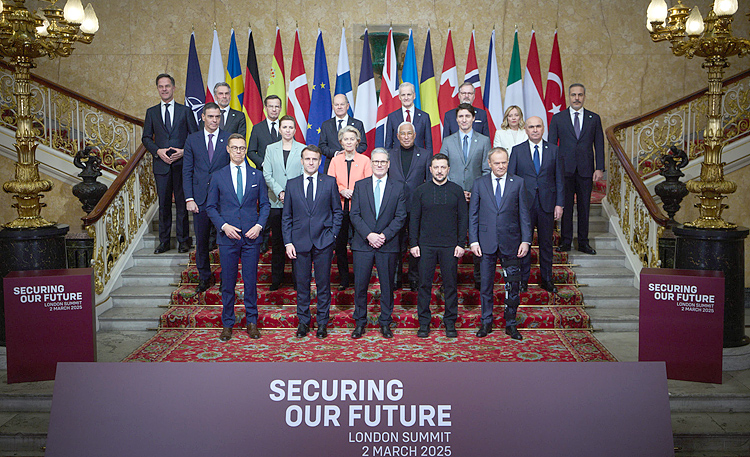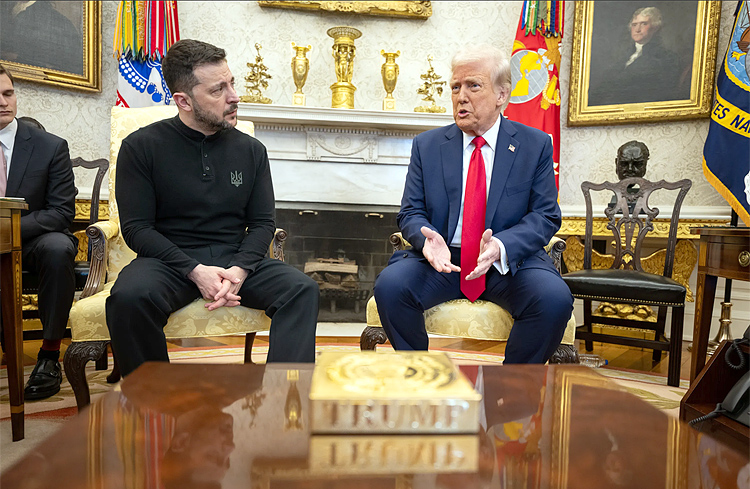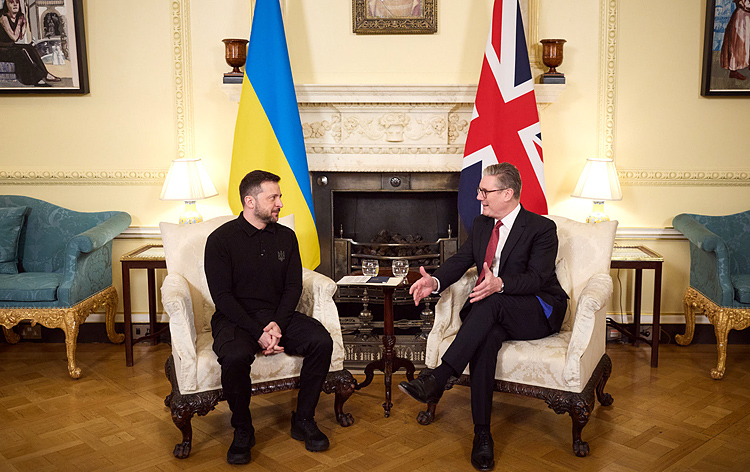INDIAN ARMED FORCES CHIEFS ON OUR RELENTLESS AND FOCUSED PUBLISHING EFFORTS

The insightful articles, inspiring narrations and analytical perspectives presented by the Editorial Team, establish an alluring connect with the reader. My compliments and best wishes to SP Guide Publications.

"Over the past 60 years, the growth of SP Guide Publications has mirrored the rising stature of Indian Navy. Its well-researched and informative magazines on Defence and Aerospace sector have served to shape an educated opinion of our military personnel, policy makers and the public alike. I wish SP's Publication team continued success, fair winds and following seas in all future endeavour!"

Since, its inception in 1964, SP Guide Publications has consistently demonstrated commitment to high-quality journalism in the aerospace and defence sectors, earning a well-deserved reputation as Asia's largest media house in this domain. I wish SP Guide Publications continued success in its pursuit of excellence.
The Phantom of a European Army
Under the influence of the American 'Deep State', EU and NATO leaders now invoke the spectre of a non-existent European Army in a desperate bid to stay relevant and gain a seat at a negotiating table
 |
The Author is former Chief of Staff of a frontline Corps in the North East and a former helicopter pilot. He earlier headed the China & neighbourhood desk at the Defence Intelligence Agency. He retired in July 2020 and held the appointment of Addl DG Information Systems at Army HQ. |

The vast stretches of colonies in Asia, Africa and the Americas that were systematically looted and plundered by the Spanish, Belgian, the Dutch, the French and the British empires, were gone by mid-sixties. The stolen wealth and neo-colonial arrangements they entered with the former colonies as they exited for continued exploitation of their mineral wealth, coupled with the fruits of industrial revolution, kept Europe prosperous for the past six to seven decades. In this endeavour, what is often relegated to the background is the generous American aid through the Marshal Plan to rebuild, repair and re-industrialise western and southern Europe. Alongside came the North Atlantic Treaty Organisation (NATO) to protect western Europe from advancing Russian troops as the WW II winded down.
Europe's Post-War Prosperity and the expansion of NATO
The Marshal Plan came to an end after four years (1948-51), more or less achieving its purpose. But NATO was given salience by the dynamics of the Cold War. The rival Soviet led Warsaw Pact was formally dissolved on July 1, 1991, following a final summit meeting in Prague. As the Soviet Union spectacularly crumbled, giving birth to 16 independent nations, the NATO should have logically folded up too. But the exact opposite happened. From 15 member states in 1991, NATO has grown to take 32 countries under its fold. This was achieved in no small measure through coaxing and coercion by the American 'Deep State' led by its Military Industrial Complex (MIC), through fear-mongering, engineered internal revolutions to install pliable leadership, subversion of governing institutions, and shepherding of the Europe's political and intellectual elites to serve American interests. Some analysts believe that Marshall Plan and NATO transformed Europe into an American vassal state.
Analysts believe that Marshall Plan and NATO transformed Europe into an American vassal state
Secure under Article 5 of the North Atlantic Treaty, the lynchpin provision which states that an armed attack against one NATO member is to be considered as an attack against all members, European armed forces began downsizing massively. Since 1991, following the dissolution of the Soviet Union, this process accelerated. Germany and Italy halved their forces, while France, Spain, and the United Kingdom nearly did the same. The only European country pursuing military growth is Poland. The combined size of all other European NATO member states' armies is smaller than the Russian contingent in Ukraine (6,00,000).
The truth is that every month, Russia loses more tanks than most European armies have in totalónot to mention the disparity in troop numbers. Yet some of these nations equipped with boutique armies miss no occasion to belittle and demonise Russia, punching grossly above their weight. Sabre rattling and false bravado has become the hallmark of some of these leaders, secure under American nuclear umbrella.

The Waning of American Support and Europe's Desperation
Former Estonian Prime Minister and now the High Representative of the EU for Foreign Affairs, Kaja Kallas is one of them. A former Soviet republic from 1944 until 1991, Estonia has a total population of 1.3 million, less than the strength of Russian armed forces which roughly stands at 1.4 million. Despite a quarter of its people being of ethnic Russian origins, Kallas had embarked on a mission to remove Soviet era monuments from public places, a cancel culture that has pushed Ukraine down its path of destruction. As the EU HR for Foreign Policy, she is at the forefront and most vociferous in pledging support for Ukraine. On X she recently posted, "Russia made a mistake by attacking Ukraine. They can't win because the will of the Ukrainian people is not broken. And European countries will stand by them". Russia has put her on a blacklist. So, who gets to negotiate on behalf of Europe, if they get a seat at the table at all? After throwing all they had against Russia these past three years, why does Europe believe that continuing the war for 'as long as it takes' is the way forward?
That is the agenda now unfolding in 2025, a change of leadership in Ukraine, so that reasonable negotiations for peace can begin
Since the ascension of President Trump, US support for Ukraine is on a backburner. Zelensky's avowed goal of becoming a NATO member has been ruled out and any hopes of claiming back the lost territories of Donbas which accounts for over 20 per cent of its landmass, leave alone Crimea which Russia annexed in 2014, dismissed as unrealistic. In this vastly altered situation, European leaders led by France, Germany and Britain are clamouring and almost threatening to raise a European Army to protect Ukraine. This call has gained greater currency and urgency after the February 28, 2025 White House snub of President Zelensky. Humiliated and escorted out, Zelensky was seen huddled in the company of Britain's Prime Minister Starmer and France's President Emmanuel Macron on March 2, 2025, holding a summit at Lancaster House in central London. PM Starmer enthusiastically and very grandiosely announced a 10,000 strong British contingent to protect Ukraine.
This preposterous idea was shot down by Starmer's own military leadership. Some "senior military sources" in the British military reportedly rejected Starmer's proposal to send a peacekeeping contingent to Ukraine as part of a "coalition of the willing," calling the plan "political theatre". "It cannot even protect itself. What is the mission? What is its legitimacy? What are the rules of engagement? How is it commanded, supplied, and housed? How long is it there for and why? No one knows."

The Changing Tide of European Politics
Veteran German journalist Patrik Baab who had been in secret talks with Kremlin in 2022 to figure out how to end the war, was asked by Kremlin representatives on how to deal with the 'crazy' leadership of Ukraine who are far removed from realities on the ground. He had replied, "you don't deal with them." That is the agenda now unfolding in 2025, a change of leadership in Ukraine, so that reasonable negotiations for peace can begin. It's an agenda that is being pursued by both President Trump and President Putin.
Ardent supporters of Zelensky in Europe who have been pushing for more military aid and more isolation of Russia are being voted out of power by electorates who are distrust with their leaders' obsession in continuing the war while they face serious cost of living hardship, high energy prices, massive deindustrialisation and lay-offs and economies hitting recession. The EU and NATO leaders under influence of the American 'Deep State' and the Biden administration had left no stone unturned in their anti-Putin rhetoric. A sharp U turn appears near impossible and now they find themselves in a bind. So, bluffing their way by periodic assertions of more 'urgent' military hardware, more sanctions (2,695 before the invasion and 21,692 after the invasion don't seem to work!) and the spectre of raising a non-existent European Army seems to be a plausible attempt to stay relevant and secure a seat on the negotiating table where they, disbelievingly, find no place.
Defanged, de-industrialised, struggling with a declining population and battling immigrant woes, Europe gasps for breath
A Fractured and Faltering Europe
EU is a deeply fractured house now, gasping for relevance. Despite stern warnings by EU HR for Foreign Policy Kaja Kallas, Slovakia's Prime Minister Robert Fico has repeatedly said that he will attend the celebrations in the Russian capital on May 9, 2025 to mark the 80th anniversary of Nazi Germany's defeat. Serbian President Aleksandar Vucic reaffirmed his attendance despite the defiance risks jeopardising Serbia's quest for EU membership. Zelensky is planning for a counter event the same day in Kyiv and may see the same set of EU leadership lining up for a show of hands. Defanged, de-industrialised, struggling with a declining population and battling immigrant woes, Europe gasps for breath. From the dying embers of an era gone by, Europe hopes to raise a European Army to defend itself. A phantom is rising, hoping the rest of the world notices!





